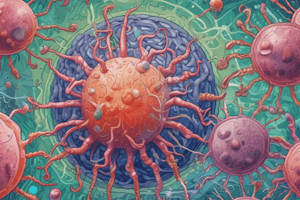Podcast
Questions and Answers
What is the shape of the rabies virus?
What is the shape of the rabies virus?
- Spherical
- Oval
- Bullet-shaped (correct)
- Helical
Which of the following animals is NOT a reservoir for rabies?
Which of the following animals is NOT a reservoir for rabies?
- Foxes
- Horses
- Dogs
- Mice (correct)
How is rabies typically transmitted?
How is rabies typically transmitted?
- Through contaminated food
- Through direct contact with an infected person
- Through the bite of a rabid animal (correct)
- Through airborne transmission
What is the most common cause of viral meningitis?
What is the most common cause of viral meningitis?
Which of the following is NOT an Arboviral disease?
Which of the following is NOT an Arboviral disease?
What is the primary vector for Eastern equine encephalitis?
What is the primary vector for Eastern equine encephalitis?
Which of the following viruses causes fever, headache, muscle pain, rash, and severe joint pain?
Which of the following viruses causes fever, headache, muscle pain, rash, and severe joint pain?
What is the primary reservoir for Powassan encephalitis?
What is the primary reservoir for Powassan encephalitis?
Which of the following diseases is primarily transmitted by Ixodes ticks?
Which of the following diseases is primarily transmitted by Ixodes ticks?
What is the primary vector for West Nile virus encephalitis?
What is the primary vector for West Nile virus encephalitis?
Flashcards
Viral Replication
Viral Replication
Viruses replicate inside host cells, causing cell damage through lysis or budding.
Varicella-zoster virus
Varicella-zoster virus
A DNA virus causing chickenpox and shingles.
German Measles
German Measles
A disease caused by the rubella virus, an RNA virus.
Measles (Rubeola)
Measles (Rubeola)
Caused by measles virus (rubeola), an RNA virus.
Signup and view all the flashcards
Acute Febrile Viral Respiratory Disease
Acute Febrile Viral Respiratory Disease
Caused by various viruses including parainfluenza, RSV, adenovirus, and certain coronaviruses.
Signup and view all the flashcards
Hantavirus Pulmonary Syndrome (HPS)
Hantavirus Pulmonary Syndrome (HPS)
Transmitted via aerosolized droplets from rodent waste.
Signup and view all the flashcards
Hepatitis A (HAV)
Hepatitis A (HAV)
ssRNA virus, transmitted via fecal-oral routes causing liver inflammation.
Signup and view all the flashcards
Hepatitis B (HBV)
Hepatitis B (HBV)
dsDNA virus, transmitted through sexual contact, drug use, or needlestick injuries.
Signup and view all the flashcards
Hepatitis D (HDV)
Hepatitis D (HDV)
Viral satellite requiring HBV coinfection, transmitted through infected blood.
Signup and view all the flashcards
Mumps (Infectious Parotitis)
Mumps (Infectious Parotitis)
Caused by the mumps virus, an RNA virus, transmitted through droplet spread and saliva.
Signup and view all the flashcardsStudy Notes
How Viruses Cause Disease
- Viruses replicate inside host cells, leading to cell destruction during escape by lysis or budding.
- Symptoms of viral infections vary based on the infection's site within the body.
Viral Infections of the Skin
- Chickenpox & Shingles: Caused by Varicella-zoster virus (a DNA virus), also known as human herpesvirus 3.
- German Measles: Caused by the rubella virus, an RNA virus.
- Smallpox: Involves two strains of variola virus (variola minor and major), a DNA virus.
- Measles: Caused by the measles virus (rubeola), an RNA virus.
- Warts: Over 70 types caused by human papillomaviruses (HPV), which are DNA viruses.
- Transmission often occurs through respiratory secretions or direct contact with infected droplets and fomites.
Viral Infections of the Lower Respiratory Tract
- Acute Febrile Viral Respiratory Disease: Caused by various viruses including parainfluenza, RSV, adenovirus, and certain coronaviruses.
- Avian Influenza (Bird Flu): Involves subtype A (H5, H7, H9), transmitted from infected poultry to humans.
- Hantavirus Pulmonary Syndrome (HPS): Caused by hantaviruses, transmitted via aerosolized droplets from rodent waste.
- Influenza: Caused by RNA viruses (types A, B, C), transmitted through infected individuals.
- Middle East Respiratory Syndrome (MERS): Caused by MERS-CoV, transmission can occur via contact with animals or infected individuals.
Most Common Types of Viral Hepatitis
- Hepatitis A (HAV): ssRNA virus, transmitted via fecal-oral routes.
- Hepatitis B (HBV): dsDNA virus, transmitted through sexual contact, drug use, or needlestick injuries.
- Hepatitis C (HCV): ssRNA virus primarily transmitted through parenteral means.
- Hepatitis D (HDV): ssRNA viral satellite requiring HBV coinfection, transmitted through infected blood.
- Hepatitis E (HEV): nonenveloped ssRNA virus, primarily transmitted through contaminated water.
Viral STDs
- Anogenital Herpes: Caused by HSV-1 or HSV-2, transmitted through direct sexual contact when lesions are present.
- Mumps (Infectious Parotitis): Caused by the mumps virus, an RNA virus, transmitted through droplet spread and saliva.
Viral Hemorrhagic Diseases
- Caused by viruses such as dengue, yellow fever, and Ebola.
- Ebola and Marburg viruses: large filamentous viruses, transmitted through contact with infected bodily fluids or vectors.
Viral Infections of the Central Nervous System (CNS)
- Lymphocytic Choriomeningitis: Caused by lymphocytic choriomeningitis virus, transmitted through exposure to mice.
- Poliomyelitis: Caused by polioviruses, transmitted via fecal-oral route and throat secretions.
- Rabies: Caused by rabies virus from animal bites, transmitted via saliva.
- Viral Meningitis: Often caused by various picornaviruses, not attributed to bacterial causes.
Selected Arthropodborne Viral Encephalitides in the U.S.
- Eastern Equine Encephalitis (EEE): Transmitted by Aedes mosquitoes, with birds and horses as reservoirs.
- West Nile Virus Encephalitis: Transmitted by Culex mosquitoes, birds serve as primary reservoirs.
- Various mosquitoes are involved in the transmission of other forms like California, LaCrosse, and St. Louis encephalitis.
New Arboviral Diseases of the Americas
- Chikungunya Virus: An RNA virus causing fever, muscle pain, rash, and significant joint pain, leading to stooped posture.
Studying That Suits You
Use AI to generate personalized quizzes and flashcards to suit your learning preferences.



